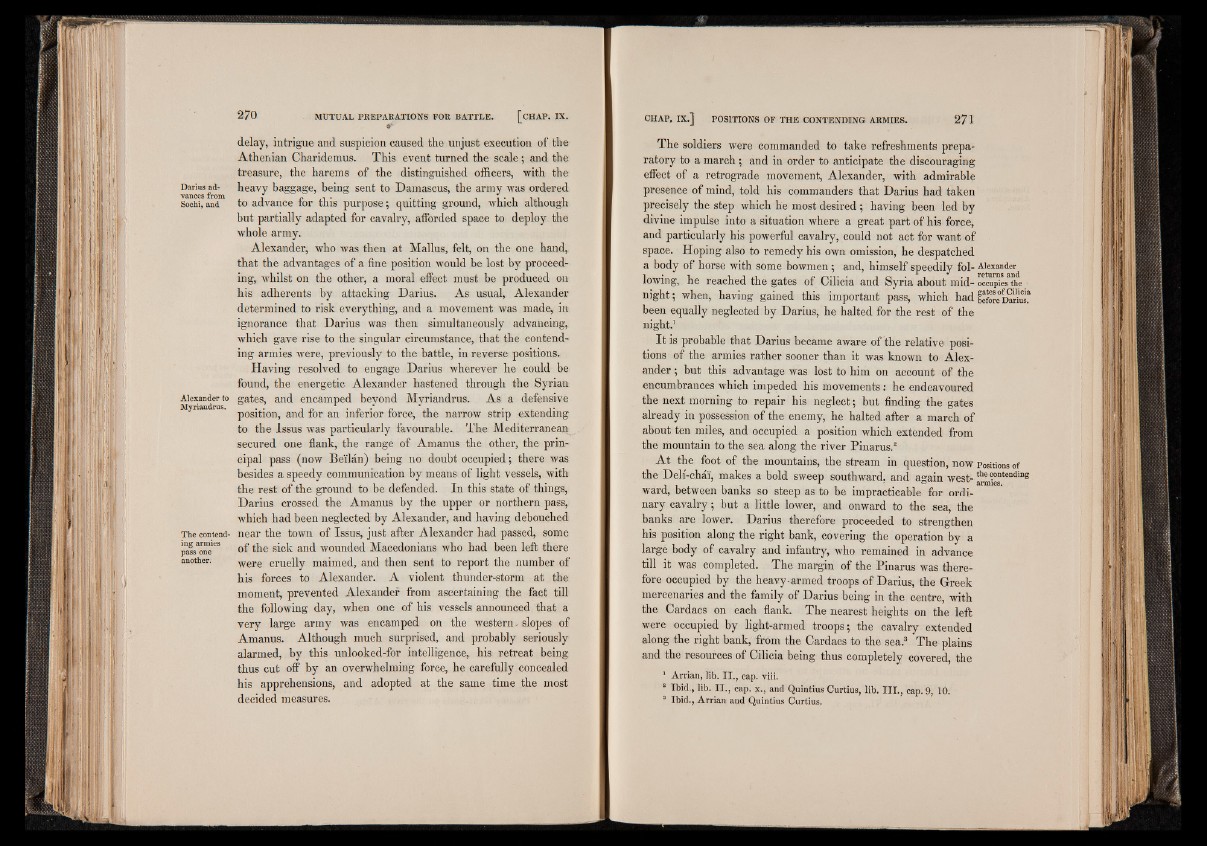
Darius advances
from
Sochi, and
Alexander to
Myriandrus.
The contending
armies
pass one
another.
270 MUTUAL PREPARATIONS FOR BATTLE. [CHAP. IX. O'
delay, intrigue and suspicion caused the unjust execution of the
Athenian Charidemus. This event turned the scale; and the
treasure, the harems of the distinguished officers, with the
heavy baggage, being sent to Damascus, the army was ordered
to advance for this purpose ; quitting ground, which although
but partially adapted for cavalry, afforded space to deploy the
whole army.
Alexander, who was then at Mallus, felt, on the one hand,
that the advantages of a fine position would be lost by proceeding,
whilst on the other, a moral effect must be produced on
his adherents by attacking Darius. As usual, Alexander
determined to risk everything, and a movement was made, in
ignorance that Darius was then simultaneously advancing,
which gave rise to the singular circumstance, that the contending
armies were, previously to the battle, in reverse positions.
Having resolved to engage Darius wherever he could be
found, the energetic Alexander hastened through the Syrian
gates, and encamped beyond Myriandrus. As a defensive
position, and for an inferior force, the narrow strip extending
to the Issus was particularly favourable. The Mediterranean
secured one flank, the range of Amanus the other, the principal
pass (now Beil an) being no doubt occupied; there was
besides a speedy communication by means of light vessels, with
the rest of the ground to be defended. In this state of things,
Darius crossed the Amanus by the upper or northern pass,
which had been neglected by Alexander, and having debouched
near the town of Issus, just after Alexander had passed, some
of the sick and wounded Macedonians who had been left there
were cruelly maimed, and then sent to report the number of
his forces to Alexander. A violent thunder-storm at the
moment, prevented Alexander from ascertaining the fact till
the following day, when one of his vessels announced that a
very large army was encamped on the western, slopes of
Amanus. Although much surprised, and probably seriously
alarmed, by this unlooked-for intelligence, his retreat being
thus cut off by an overwhelming force, he carefully concealed
his apprehensions, and adopted at the same time the most
decided measures.
The soldiers were commanded to take refreshments preparatory
to a march; and in order to anticipate the discouraging
effect of a retrograde movement, Alexander, with admirable
presence of mind, told his commanders that Darius had taken
precisely the step which he most desired ; having been led by
divine impulse into a situation where a great part of his force,
and particularly his powerful cavalry, could not act for want of
space. Hoping also to remedy his own omission, he despatched
a body of horse with some bowmen; and, himself speedily fol- Alexander
lowing, he reached the gates of Cilicia and Syria about mid- occupies the |
night ; when, having gained this important pass, which had before Darius!1
been equally neglected by Darius, he halted for the rest of the
night.1
It is probable that Darius became aware of the relative positions
of the armies rather sooner than it was known to Alexander
; but this advantage was lost to him on account of the
encumbrances which impeded his movements: he endeavoured
the next morning to repair his neglect; but finding the gates
already in possession of the enemy, he halted after a march of
about ten miles, and occupied a position which extended from
the mountain to the sea along the river Pinarus,2
At the foot of the mountains, the stream in question, now Positions of
the Deli-chai, makes a bold sweep southward, and again west- *^™tetlding
ward, between banks so steep as to be impracticable for ordinary
cavalry; but a little lower, and onward to the sea, the
banks are lower. Darius therefore proceeded to strengthen
his position along the right bank, covering the operation by a
large body of cavalry and infantry, who remained in advance
till it was completed. The margin of the Pinarus was therefore
occupied by the heavy-armed troops of Darius, the Greek
mercenaries and the family of Darius being in the centre, with
the Cardacs on each flank. The nearest heights on the left
were occupied by light-armed troops; the cavalry extended
along the right bank, from the Cardacs to the sea.3 The plains
and the resources of Cilicia being thus completely covered, the
1 Arrian, lib. I I ., cap. viii.
3 Ibid., lib. I I ., cap. x., and Quintius Curtius, lib. I I I ., cap. 9, 10.
3 Ibid., Arrian and Quintius Curtius,